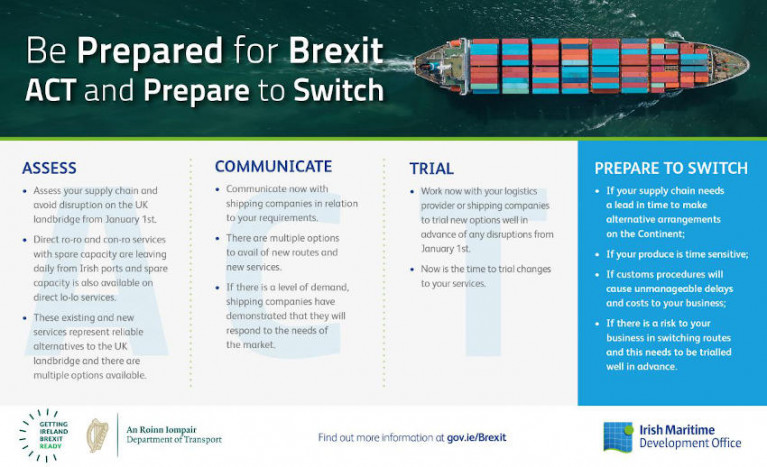Displaying items by tag: Assess Communicate Trial
IMDO To Marine Transport: ‘ACT Now & Prepare to Switch’ Before Brexit
‘ACT now and Prepare to Switch’ — that’s the message to the logistics and maritime transport sectors from the IMDO as the prospect of a disorderly Brexit looms.
The two-part strategy for stakeholders begins with ACT, or Assess, Communicate, Trial.
As highlighted by the Government since 2018, Irish industry needs to assess supply chains to avoid disruption on the UK landbridge from 1 January 2021.
There is maritime capacity available on both existing and new services to transport goods directly to Continental Europe across different modalities (RO/RO, CON/RO, LO/LO), which represent reliable alternatives to the landbridge.
Now is also the time to communicate your requirements to shipping companies.
There are multiple options to avail of new routes and new services. If there is a level of demand, shipping companies have demonstrated that they will respond to exporters’ needs — the latest being CLdN, which has indicated it can “dramatically” increase its direct services to the Continent if need be.
The next step is trial — work now with your logistics provider or shipping companies to trial new options well in advance of any changes after the Brexit transition period ends.
Stakeholders should Prepare to Switch to direct services to the Continent to protect their route to market and avoid disruption on the UK landbridge. This is especially important if:
- Your supply chain needs a lead in time to make alternative arrangements on the Continent;
- Your produce is time-sensitive;
- Customs procedures will cause unmanageable delays and costs to your business;
- There is a risk to your business in switching routes and this needs to be trialled well in advance.
For more information on planning for Brexit, see gov.ie/Brexit





























































